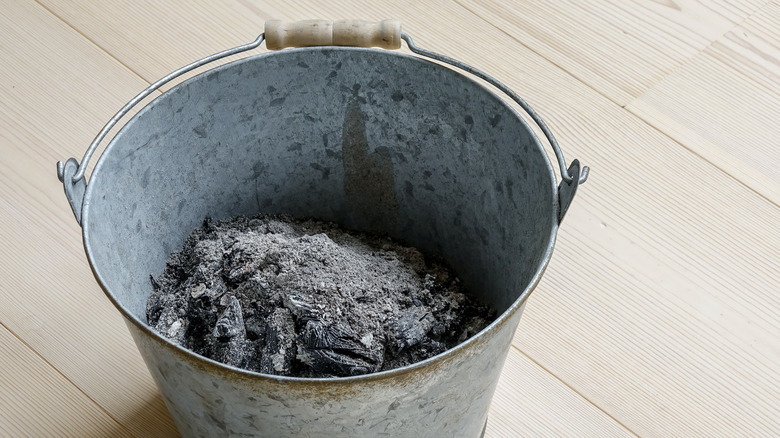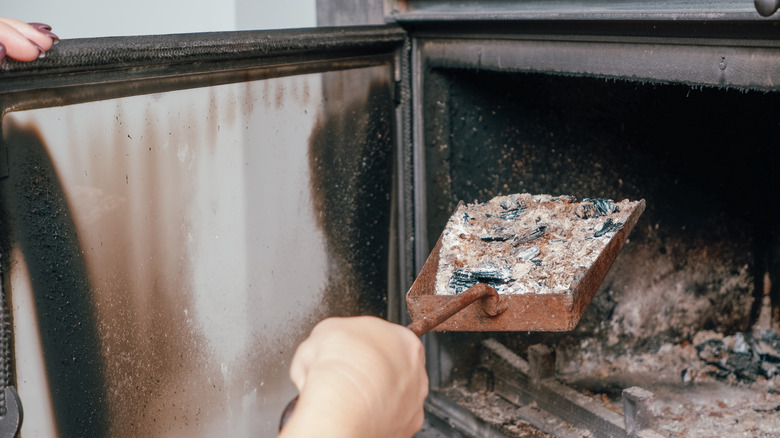Keep Your Closet Smelling Fresh With This Unexpected Household Waste
If you have a wood-burning stove or fireplace, it likely gets plenty of use in the winter. With fire comes ash, and lots of it. While you might view this ash as household waste and a nuisance to get rid of, it actually has many uses in and around your home. Wood ash is good for garden soil; add it to your compost for much-needed nutrients. If your pet has come in from outside stinking after a dalliance with an angry skunk, rub a handful of wood ash into their fur to neutralize the smell. Inside, you can use it to deodorize all kinds of spaces, from your fridge-freezer to your clothes closet.
Its efficacy isn't so surprising if you think about it. For centuries, people have been mixing wood ash, animal fat, and water to make a powerful — and odor-neutralizing — laundry soap. It works a little differently when deodorizing the air in a small space like a cupboard. Ash and, especially, charcoal are highly porous; they absorb the minute chemical compounds that cause the unpleasant smell. If you're dealing with a musty odor produced by mold and mildew, ash works to soak up the moisture these organisms thrive on, drying the space. Wood ash is also highly alkaline; it will neutralize smells caused by acidic agents.
Scientists agree
Researchers of a 2001 study published in Water Environment Research tested high carbon concentration wood ash — in this case, a waste by-product of industrial paper making — in the laboratory and found it possesses odor elimination abilities similar to activated carbon. Cat litter made with soybean hull biochar (ash from burned soybeans) was superior to standard litter formulations for odor reduction, a study published in a 2023 volume of Bioresource Technology Reports reveals. Boating enthusiast magazine Practical Sailor rates wood ash as their "best choice for odor elimination and dehydration" in composting toilets on boats, even going so far as to suggest people use the ash from onboard wood burners.
Similar advice carries over to land-lubbing homeowners with fireplaces. Collect your ash from the hearth only once the fire has died down and the ash is cool to the touch. Wear a mask — ash is feather-light, and you don't want a heavy sigh to send it flying — and gloves, as the aforementioned alkalinity of ash can harm those with sensitive skin. Fill a small old bowl, Mason jar, paper bag, or empty tin can with the gathered ash. If the bowl is uncovered, put it in the top of your closet, as far to the back as possible, or anywhere else it won't get knocked or brushed over when removing or storing clothes, shoes, towels, and bedsheets. You can do the same for a stinky fridge, freezer, or any other small, out-of-the-way space suffering from an undesirable stench.
Be responsible
While there's no doubt wood ash works as a deodorizer, there are some best practices you need to adhere to. Always know the source of the wood ash; in other words, what type of wood was burnt to produce the ash you're putting in your closet. Never use ash from pressure-treated, stained, or painted timber, including lumber from construction sites or otherwise upcycled. You shouldn't be burning this type of wood anyway. It's classified as hazardous by the U.S. EPA for good reason: the various treatments release harmful chemicals, like arsenic, when burned. Ash from wood pellets — also called pellet fuel — is problematic, too; it may contain higher than acceptable levels of heavy metals.
Even if you're confident of safe origins, ash from any organic material is carcinogenic. Inhaled ash particles will irritate your airways, even triggering asthma attacks. There's also a small fire risk. Sometimes, seemingly cold wood ash still has minute embers burning away in the center. This should be common knowledge to those who clean stone fireplaces regularly, but for those new to fireplace care, wait a few days after putting your wee pile of ash into a bowl or bag (watch the vessel like a hawk) to be sure it's not still active. If the ash somehow mixes with water, it will create a caustic paste that could burn your skin. Keep your bowl of deodorizing ash away from water sources — for example, don't use it in an above-the-basin bathroom cabinet or near plumbing pipes.


